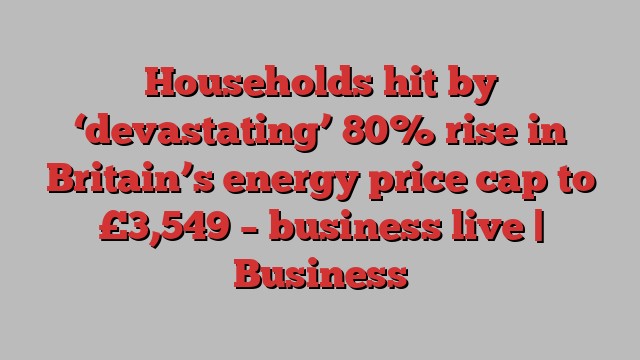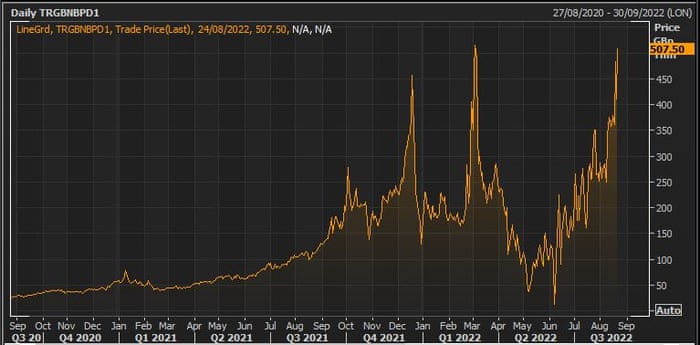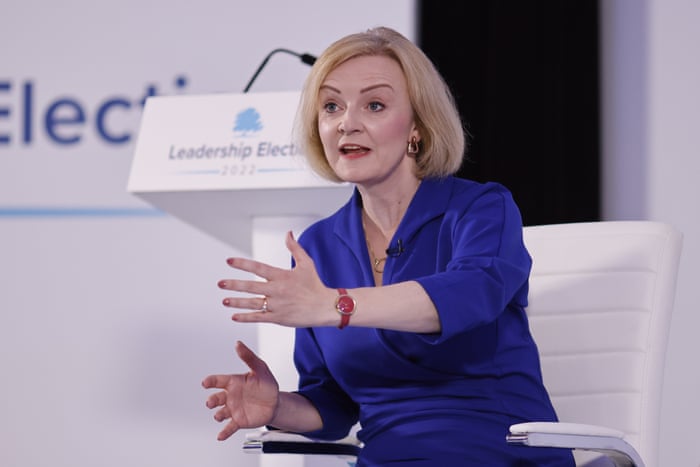
Introduction: Ofgem to announce energy price cap today
Good morning.
The scale of Great Britain’s winter energy crisis will be laid bare this morning, when regulator Ofgem announces how high the price cap on bills will rise in October.
Ofgem is expected to approve a record increase, lifting the average annual dual-fuel tariff in England, Scotland and Wales to above £3,500 a year from October for the average dual-fuel tariff.
That would be an staggering increase of 80%, from the current average cap of £1,971.
The surge in gas prices this year due to the Ukraine war, and Russia’s cuts to European energy supplies, mean households and businesses face very painful increases in bills.

Millions more homes face being pushed into fuel poverty, while firms (who aren’t covered by the price cap) are warning that they will not be able to keep operating without help.
Analysts predict that prices will keep rising in 2023 too. Cornwall Insight, the energy consultancy, have estimated annual bills will surge again to £4,649 from January to March, and £5,341 from April to June.
Other analysts have predicted even higher rises, as wholesale gas prices have soared in recent weeks.
This energy shock will need fresh government support, economists insist, on top of the cost-of-living package announced in May.
Labour have already called for an emergency budget, and a freeze in bills this winter, costing an estimated £29bn. It says the two candidates to lead the Conservative Party have failed to grasp the scale of the crisis, even though two-thirds of households, or about 45 million people, could be pushed into fuel poverty by January.
Rishi Sunak has promised to scrap VAT on energy bills and an as yet uncosted increase in help for households on benefits, while Liz Truss has pledged assistance “across the board” for companies and households.
Yesterday, education minister Will Quince pledged there would be more support on top of Sunak’s initial energy package three months ago.
“There is no question in my mind whatsoever, both listening to the two leadership candidates but also just looking at our economy … that the Government is going to act and put in place a further package of support measures,” Quince told LBC radio.
“Now, we will have to wait a couple of weeks for a new Prime Minister to set out their agenda alongside a new Chancellor, but both leadership contenders have been clear there will be a fiscal event and more help will be coming.”
Ofgem’s announcement is expected at 7am.
Also coming up today:
What’s said to be the UK’s biggest strike of the summer is taking place today, as Royal Mail staff hold industrial action in a pay dispute.
More than 100,000 postal workers are expected to take part, as the Communication Workers Union (CWU) pushes for a wage rise to reflect soaring inflation.
The CWU says it’s rejected a 2% pay rise, pointing out that:
“In an economic climate where inflation looks set to soar to 18 per cent by January 2023, the imposition will lead to a dramatic reduction in workers’ living standards”.
But Royal Mail says its deal is worth 5.5% (still below inflation), if workers accept new terms and conditions including more Sunday deliveries, as it tries to compete for more parcel delivery business.
Central bankers are gathering in Wyoming for the annual Jackson Hole economic symposium, where the fight against persistent global inflation will be high on everyone’s mind.
Jerome Powell, the head of America’s central bank, will give an eagerly-awaited speech at 3pm UK time. Investors will watch whether Powell reiterates the Federal Reserve’s stance of raising interest rates to cool prices, or hints at a pivot, as major economies slip towards recession.
We think Chair Powell should send a “pivot” signal tomorrow, i.e. a transition to slower rate hikes going forward. The global economy is going into recession, led by the Euro zone, and growth is very weak in China. That will inevitably spill back into the US and slow inflation… pic.twitter.com/neDlNNwlgE
— Robin Brooks (@RobinBrooksIIF) August 25, 2022
The agenda
-
7am BST: Ofgem announces UK price cap changes
-
7am BST: GfK’s German consumer confidence survey
-
1.30pm BST: US PCE index of inflation for July
-
3pm BST: Federal Reserve chair Jerome Powell speaks at Jackson Hole
-
3pm BST: University of Michican’s consumer confidence index for August
Key events
Filters BETA
Ofgem says the increase in energy bills reflects the continued rise in global wholesale gas prices, which began to surge as the world unlocked from the Covid pandemic and have been driven still higher to record levels by Russia slowly switching off gas supplies to Europe.
Ofgem lifts Britain’s energy price cap to £3,549
Millions of households in Great Britain face a leap in energy bills from October after the regulator raised the maximum that suppliers can charge, meaning average homes face paying £3,549 a year.
As feared, Ofgem has approved a sharp rise in the current price cap, up from £1,971, for the average dual-fuel tariff – an increase of 80%.
The move will intensify the UK’s cost of living crisis, with inflation already over 10%, and add to pressure on the government to announce a new package of support.
Details and reaction to follow…
Aubrey Allegretti
Liz Truss doubled down on her reluctance to “bung more money” at those who will struggle to afford spiralling energy costs this winter, while Rishi Sunak said millions may be forced into destitution without extra support, as the pair clashed at the penultimate hustings of the Conservative leadership race last night.
With energy regulator Ofgem expected to raise the price cap to £3,500 a year from October for the average dual-fuel tariff, Truss warned the issue of spiralling fuel costs was not a short-term one.
She told the audience in Norfolk:
“If people think this problem is going to be over in six months they are not right. This is a long term problem.”
But Sunak said her planned tax cuts would fail to help pensioners and those on lower incomes, and added that extra support for businesses struggling with energy bills was “clearly something the new prime minister will have to look at”.
The union Unite has accused energy companies of “rampant corporate profiteering”, adding to the cost of energy.
Unite has calculated that major energy suppliers, distributors and generators had made a combined £15.8bn in profits in the past year. Unite general secretary Sharon Graham claims “rampant corporate profiteering is at the very heart of soaring energy bills”.
Unite national officer for energy, Simon Coop, said:
“Ofgem is a regulator which doesn’t regulate.
It appears to simply be passing the parcel of the energy giants’ profits directly on to the consumer. It’s clear that piecemeal action will not solve the scale of these problems. Sooner or later taking the energy giants back into public ownership will have to be contemplated.”
Almost half of Britons questioned on the UK’s current energy crisis blame the Government more than the energy firms, according to a new poll.
Research by Focaldata of 1,021 adults from across the UK showed that 47% of respondents blame ministers for “failing to prepare and prevent” the huge rise in energy bills.
Just under a third, 30%, condemn the energy firms.
The polling, on behalf of Cavendish Advocacy found that 92% of people who took part are “concerned” about the energy crisis, with two-thirds “very concerned”.
Tom Bradley, head of energy & green growth at Cavendish Advocacy, said the situation will get worse once the price cap is announced.
“The debate has moved on as to how the country has reached a critical point where energy bills may top more than £3,500 a year.
“Our polling shows that the public expects both politicians and the energy industry to take responsibility and bring more stability and affordability to the market.
“Surprisingly, almost a fifth of UK adults are willing to pay more if the money was invested in better infrastructure to prevent potential blackouts or gas supply issues.
“The cost of living is the core issue dominating our politics right now, and that is being driven by soaring energy prices. The public will be looking on with much interest on Friday as to what politicians and the industry do next to try and mitigate this energy crisis.”
Truss promises ‘immediate support’ to fight energy crisis, if she becomes PM


Liz Truss, the front-runner to succeed Boris Johnson as prime minister, has pledged ‘immediate support’ to help the hardest hit families with soaring power bills if she becomes prime minister.
Writing in the Dail Mail, Truss (who has previously favoured tax cuts over ‘handouts’) says:
“The impact on our cost of living is clear at the supermarket checkout, at the petrol pump and on our latest energy bills.
“I know how hard it is for millions of Britons, and how grave concerns are about the consequences of today’s decision by Ofgem on the next energy price cap.
“The rest of Europe is facing the same challenge, which will loom large as winter sets in.
“If I am elected leader of the Conservative Party and prime minister, I will take decisive action on entering No 10 to provide immediate support, but will also tackle the root causes of these issues so we are never again in this difficult position.
“To those of you feeling the squeeze, my message is clear: I will ensure support is on its way and we get through these tough times.”
My immediate priority will be to put more money back in people’s pockets by cutting taxes, such as reversing the rise in national insurance.
I would also suspend the green levy on energy bills, bringing down average energy bills by £153. This will build on the work already underway, such as the Energy Bills Support Scheme, which will see a £400 discount paid to consumers from October, and the £1,200 package of support for the most vulnerable.
More here: Truss unveils plans to beat energy crisis: Tory leadership favourite ‘will give multi-billion bailout to hardest-hit families’ as price cap rockets to £3,500-a-year from TODAY and reveals she will hold emergency budget DAYS after entering No10 if she wins
Starmer: rising energy bills will be devastating for people and businesses


Keir Starmer MP, Leader of the Labour Party, has warned that the energy price cap rise will be ‘devastating’:
“The announcement of a dramatic increase in the cost of energy bills is going to be devastating for people and businesses across the country.
“Labour’s fully-funded plan to freeze bills and save households £1,000 this winter is a simple matter of common sense and fairness. We will not allow oil and gas giants to make record profits from the suffering of ordinary families and businesses. It’s astounding the government does not understand this.
“As well as acting to fix the immediate problem, Labour will also bring down bills in the long-term by investing in sustainable British energy and insulating homes across the country.
“The fact the government is absent at this time of national crisis is unforgiveable. Families and business owners are worried sick. Everyone is now feeling the harsh reality of the Tories’ failure. The country deserves strong leadership, urgent action and a plan for the future. Only Labour can give Britain the fresh start it needs.”
Full story: Labour calls for emergency budget as energy cap set to top £3,500


Alex Lawson
Wih pressure mounting for an emergency budget to tackle the cost of living crisis, stark data showed that Britons are already worried about bills this summer despite low energy usage compared with the winter peak.
A YouGov poll showed about 40% of 1,700 adults surveyed have struggled with food and energy bills over the past three months. Around three-quarters of those polled said the government is doing too little to help those struggling with the recent rise in the cost of living, including two-thirds of Conservative voters.
The shadow chancellor, Rachel Reeves, said:
“The only people resisting measures to help people are the government. We wanted parliament to be recalled ahead of the [Ofgem] announcement but that did not happen.
“We want an emergency budget. We want the government to say what they are going to do. This announcement is going to strike fear into the hearts of families up and down the country. Urgent action is needed. Everyone has come up with plans for action apart from Liz Truss and Rishi Sunak – the two people who can actually do something about it – who have been silent.”
Here’s the full story:
Introduction: Ofgem to announce energy price cap today
Good morning.
The scale of Great Britain’s winter energy crisis will be laid bare this morning, when regulator Ofgem announces how high the price cap on bills will rise in October.
Ofgem is expected to approve a record increase, lifting the average annual dual-fuel tariff in England, Scotland and Wales to above £3,500 a year from October for the average dual-fuel tariff.
That would be an staggering increase of 80%, from the current average cap of £1,971.
The surge in gas prices this year due to the Ukraine war, and Russia’s cuts to European energy supplies, mean households and businesses face very painful increases in bills.



Millions more homes face being pushed into fuel poverty, while firms (who aren’t covered by the price cap) are warning that they will not be able to keep operating without help.
Analysts predict that prices will keep rising in 2023 too. Cornwall Insight, the energy consultancy, have estimated annual bills will surge again to £4,649 from January to March, and £5,341 from April to June.
Other analysts have predicted even higher rises, as wholesale gas prices have soared in recent weeks.
This energy shock will need fresh government support, economists insist, on top of the cost-of-living package announced in May.
Labour have already called for an emergency budget, and a freeze in bills this winter, costing an estimated £29bn. It says the two candidates to lead the Conservative Party have failed to grasp the scale of the crisis, even though two-thirds of households, or about 45 million people, could be pushed into fuel poverty by January.
Rishi Sunak has promised to scrap VAT on energy bills and an as yet uncosted increase in help for households on benefits, while Liz Truss has pledged assistance “across the board” for companies and households.
Yesterday, education minister Will Quince pledged there would be more support on top of Sunak’s initial energy package three months ago.
“There is no question in my mind whatsoever, both listening to the two leadership candidates but also just looking at our economy … that the Government is going to act and put in place a further package of support measures,” Quince told LBC radio.
“Now, we will have to wait a couple of weeks for a new Prime Minister to set out their agenda alongside a new Chancellor, but both leadership contenders have been clear there will be a fiscal event and more help will be coming.”
Ofgem’s announcement is expected at 7am.
Also coming up today:
What’s said to be the UK’s biggest strike of the summer is taking place today, as Royal Mail staff hold industrial action in a pay dispute.
More than 100,000 postal workers are expected to take part, as the Communication Workers Union (CWU) pushes for a wage rise to reflect soaring inflation.
The CWU says it’s rejected a 2% pay rise, pointing out that:
“In an economic climate where inflation looks set to soar to 18 per cent by January 2023, the imposition will lead to a dramatic reduction in workers’ living standards”.
But Royal Mail says its deal is worth 5.5% (still below inflation), if workers accept new terms and conditions including more Sunday deliveries, as it tries to compete for more parcel delivery business.
Central bankers are gathering in Wyoming for the annual Jackson Hole economic symposium, where the fight against persistent global inflation will be high on everyone’s mind.
Jerome Powell, the head of America’s central bank, will give an eagerly-awaited speech at 3pm UK time. Investors will watch whether Powell reiterates the Federal Reserve’s stance of raising interest rates to cool prices, or hints at a pivot, as major economies slip towards recession.
We think Chair Powell should send a “pivot” signal tomorrow, i.e. a transition to slower rate hikes going forward. The global economy is going into recession, led by the Euro zone, and growth is very weak in China. That will inevitably spill back into the US and slow inflation… pic.twitter.com/neDlNNwlgE
— Robin Brooks (@RobinBrooksIIF) August 25, 2022
The agenda
-
7am BST: Ofgem announces UK price cap changes
-
7am BST: GfK’s German consumer confidence survey
-
1.30pm BST: US PCE index of inflation for July
-
3pm BST: Federal Reserve chair Jerome Powell speaks at Jackson Hole
-
3pm BST: University of Michican’s consumer confidence index for August